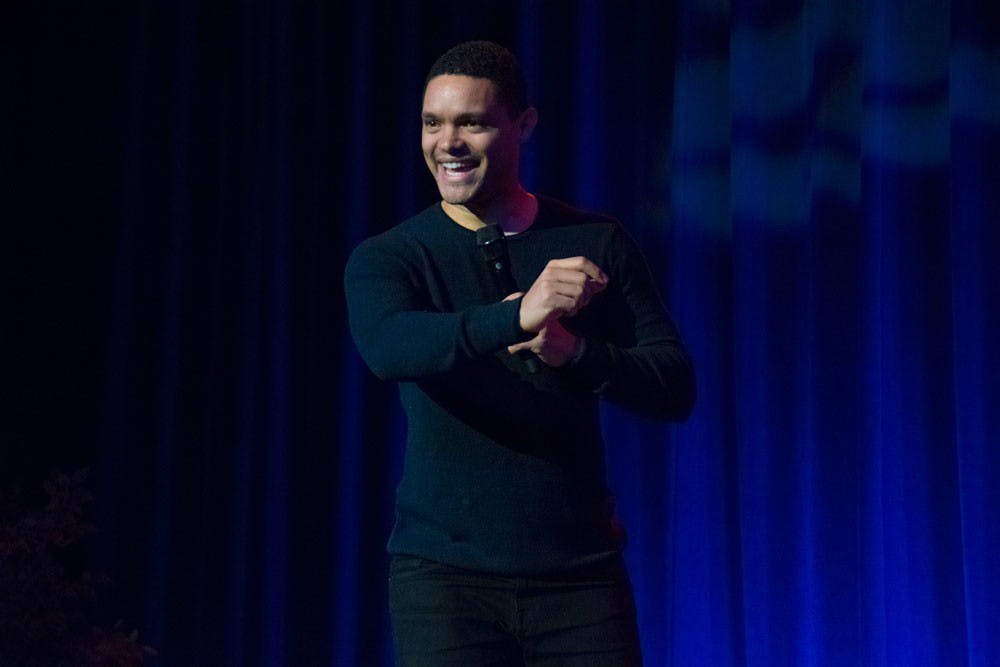Trevor Noah had no filter while performing his material.
Noah made it clear from the start of the show that he didn’t care what type of provocative slurs he used. He joked with the crowd about how uncomfortable they seemed after he said the n-word.
Noah headlined the Student Association’s annual Comedy Series in Alumni Arena Saturday night, enticing fans with colorful stories of his journey from South Africa to the U.S., as well as his opinions on current events and politics. The performance was exclusively open to UB undergraduates. Roughly 3,750 were in attendance and the show cost $110,000 to produce, according to Marc Rosenblitt, SA Enterntainment Coordinator.
Noah is best known for anchoring “The Daily Show” on Comedy Central after succeeding Jon Stewart in 2015. Noah is also a New York Times bestselling author of “Born a Crime.”
Noah took the stage with some perfectly timed Buffalo wing jokes. He opened the show commenting on how cold Buffalo is and asked, “How does anyone live here?”
Noah’s laid back, dry humor propelled into more than an hour-long show and hit all of the big social issues in the news at the moment including: race, politics and immigration. Noah took quick jabs at President Donald Trump and never failed to make the audience laugh about more serious issues like immigration.
Most of the topics he discussed arguably could have been segments on his show, and it was as if the audience was treated to a live recording.
Noah talked about cell phones devolving millennials - a topic that took a bit of warming up before the audience cracked a laugh. Noah argued that cell phones are affecting women the most and that once a girl gets trapped in “a vortex of selfies,” there’s nothing one can do to save her.
Noah also poked fun at some of his first experiences after moving to Los Angeles from South Africa four years ago.
He recalled living with his friend Dave, a typical laid back Californian surfer guy. He talked about his first time trying tacos, something he never had growing up.
Mike Brown, a sophomore computer science major, thought Noah’s focus on the significance of language was the best part of the show.
“I laughed the hardest at the taco truck story about the napkin,” Brown said. “He showcased a lot of hilarious examples of differences in word meanings in the English language and African languages.”
Brown said he also appreciated how serious Noah’s jokes were at times and liked how Noah addressed world issues such as racism and politics.
“I think he had a funny yet compelling and insightful approach to those more challenging topics,” Brown said.
Leo Romeo, a freshman media study major, enjoyed how current Noah’s material was. He added that Noah did a good job at targeting his material toward a college audience.
“Trevor Noah was able to connect with us on what is happening in society today,” Romeo said. “He talked about all the things that matter to college students; politics, pop culture, and race. He knew how to make us laugh and make the horrible things seem funny.”
A reoccurring theme in Noah’s show was tales of growing up poor in Africa. He compared how fun his African friends’ first trip to America and Disney World was to what fun was like in South Africa.
“We went to Disney world and they were having so much fun. Literally we weren’t even doing anything, we were just standing in the park and they were going crazy they just kept saying ‘oh my god this is so much fun.’”
Noah focused the last portion of his show on addressing race and politics.
“I never thought I'd check twitter to see how dangerous the world is that day, I don't understand how he could be the president of anything everything he says is insane,” he said regarding Trump’s use of Twitter.
He commented on how absurd it was that Trump wants to keep certain people out of the country. He suggested that since the U.S. gets flavor from all over the world, Americans shouldn't use any spices that come from other countries.
“If you don’t like a certain race of people, don’t eat their food. How about that?! Then all you’d be stuck with is potatoes, no spices just bland potatoes,” Noah said.
Noah’s ending bit was one of the most serious of the night. In his African tongue, the word nig*er means, “to give.” He said he was confused of the meaning of the word when he got to America.
“As a kid, if my mother saw me arguing with my cousins over who could play with a toy, she’d point to my cousin and say ‘nig*er please.’ It’s similar to hating only black cars, don’t let it bother you, the word without action doesn’t mean anything,” Noah said.
He continuously emphasized it’s the action behind the word, not the word itself. He told the audience to do as his mother told him.
“If someone calls you the n-word, give it back to them with a smile and they won’t know what to do with themselves,” Noah said.
Fellow South African comedian David Kibuuka opened for Noah; he came out energetic and ready to warm the crowd up.
From making jokes about having sex to the awkwardness of the fairy tale Humpty Dumpty, Kibuuka succeeded in reaching the crowd, but sometimes missed the mark on his jokes.
“I felt that he was funny with some of the beginning material, but as he continued, his jokes fell flat and I could tell that some of them just made people feel uncomfortable,” Brown said.
Noah and Kibuuka proved to be a dynamic duo, delivering an entertaining performance for this year’s Comedy Series.
Max Kalnitz is the Senior Arts Editor and can be reached at max.kalnitz@ubspectrum.com





